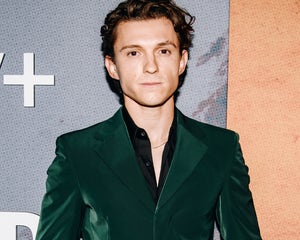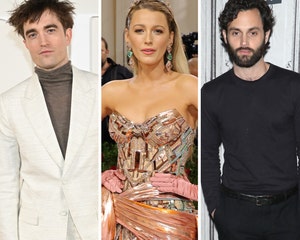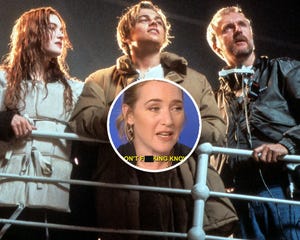12 Actors Whose Roles Really Impacted Their Mental Health

"I don't think you can go through something like this and not have some sort of PTSD afterward."
Some actors take embodying a character to the next level — and it’s not always beneficial in the long run. While fully immersing themselves in a character may make for a great movie, it can take a toll on the actor’s mental health, especially if it was an intense role. Even after filming wraps, it can be a challenge for these stars to return to normal life and fully shake off the characters they portrayed.
Find out what these actors had to say about how their roles impacted their mental health…
1. Tom Holland
Tom Holland decided to take a year off from acting after starring in psychological thriller “The Crowded Room” because it really impacted his mental health. While he shared that he was used to the “physical aspects” of being an actor, he says dealing with the mental side of things was a new experience.
“The mental aspect, it really beat me up and it took a long time for me to recover afterwards, to sort of get back to reality…I was seeing myself in [Danny], but in my personal life. I remember having a bit of a meltdown at home and thinking, like, ‘I’m going to shave my head. I need to shave my head because I need to get rid of this character.’ And, obviously, we were mid-shooting, so I decided not to…It was unlike anything I’ve ever experienced before,” he told Entertainment Weekly.
2. Lady Gaga
Lady Gaga got so into character while filming “House of Gucci,” that she ended up needing a psychiatric nurse with her because she “felt that it was safer” for her. Gaga says that even when she wasn’t filming, she still lived as Patrizia Gucci and as a result, she “brought the darkness” home with her “because her life was dark.”
“I don’t think that any actor should push themselves to that limit. And I ask myself all the time why I do that. I’ve done some pretty extreme art pieces throughout my career — the things I’ve put my body through, my mind. It’s like a walnut of sadness in my stomach as I say this to you. I don’t know why I’m like that,” she told Variety. “I think that the best answer I could give you is I have a sort of romantic relationship with suffering for your art that I developed as a young girl, and it just sometimes goes too far. And when it does go too far, it can be hard to reel it in on your own…It’s OK to ask for help. If you’re feeling like that, ask for help. No matter what.”
3. Zendaya
While filming season 2 of “Euphoria,” Zendaya admits she struggled with some of the things she had to do while portraying her character Rue. She says she “didn’t want to see Rue like that, or have to go through that” and she also didn’t want her body to have to go through it.
“Your body is a person, it doesn’t know that what you’re doing is not real. My brain can say ‘ok I’m pretending’ but when I’m doing it, my body and my heart don’t know that it’s not real. It can be exhausting in that way and it can make you feel bad because she says and does things that I don’t want her to do and say, but here I am,” she told Elle Australia.
4. Michael B. Jordan
Michael B. Jordan’s intense preparations for his role in “Black Panther” definitely ended up taking a toll on his mental health. Ahead of the movie, he isolated himself from friends and family in order to experience the same loneliness as his character — but when filming wrapped, he had a hard time shaking it off.
“I didn’t have an escape plan. It was a little tough for me at first…Readjusting to people caring about me, getting that love that I shut out. I shut out love, I didn’t want love. I wanted to be in this lonely place as long as I could…I went to therapy, I started talking to people, starting unpacking a little bit,” Michael told Oprah during a “SuperSoul Conversations” special.
Tom Holland Says The Crowded Room 'Did Break Me', Announces Year Hiatus from Acting
5. Anne Hathaway
Anne Hathaway’s role as Fantine in “Les Misérables” was difficult for her both mentally and physically. In order to portray the dying sex worker, Anne dropped 25 pounds using a strict cleanse and a “near starvation” diet. On top of that, many of the scenes she filmed were emotionally taxing, including traumatic moments where she got her hair shorn, her teeth yanked out and was assaulted by a sailor.
“I had to be obsessive about it — the idea was to look near death. Looking back on the whole experience — and I don’t judge it in any way — it was definitely a little nuts…I was in such a state of deprivation — physical and emotional. When I got home, I couldn’t react to the chaos of the world without being overwhelmed. It took me weeks till I felt like myself again,” Anne shared with Vogue.
6. Alex Wolff
Alex Wolff says that filming supernatural psychological horror film “Hereditary” left him experiencing symptoms of PTSD. After all of the “disturbing s—” he saw on set, he was unable to sleep at night, which he tried to overcome by channeling all of his negative thoughts at the same time.
“When I started talking about it, all these flashes with all this disturbing s— I went through sort of came back in a flood. It kept me up at night to where I got into a habit of emotional masochism to the point of just trying to take in every negative feeling I could draw from. I forced it upon myself rather than the opposite of what you’d usually do in life, which is sit on the heater until it starts to burn and you jump up immediately. I had to do the exact opposite of that and absorb the pain and let it burn. It’s a reverse emotional thing. It’s hard to describe eloquently, it’s just a feeling. I don’t think you can go through something like this and not have some sort of PTSD afterward,” Alex said in an interview with Vice.
7. Bill Skarsgård
While portraying Pennywise in “It,” Bill Skarsgård says it began to feel like he was in a “very destructive relationship” with the evil character. Even after filming wrapped, he had a hard time shaking Pennywise and began to have “very strange and vivid” dreams about him. Finally, he had the realization that he didn’t have to be miserable anymore and was able to let it go.
“After we wrapped, I was in my childhood home in Sweden, sitting having coffee with my mom at our kitchen table, and realized, ‘Oh, holy s—, I don’t have to deal with this relationship anymore!’ It was a very quick shift of just feeling better, like, ‘Oh my God, I’m relieved that I don’t have to deal with the darkness of the character.’ I likened it to an exorcism – him exiting my body and getting rid of the Pennywise toxins,” he told Entertainment Weekly.
8. Jamie Foxx
When Jamie Foxx starred as Ray Charles in the biopic about his life, director Taylor Hackford requested that Jamie’s eyelids be glued shut in order to add authenticity to the role. It ended up causing panic attacks for him — only made worse when his colleagues often left him alone because they forgot he couldn’t see.
“Imagine having your eyes glued shut for 14 hours a day. That’s your jail sentence,” he told the New York Times.
10 Actors Who Don't Like Their Most Famous Character
9. Kate Winslet
Shortly after portraying a former Nazi camp worker in “The Reader,” Kate Winslet admitted that the role had been very mentally tough for her. Even after filming wrapped, Kate says she was suffering on the inside and was “still absolutely haunted and traumatized by so much of what [she] saw during the preparation process.”
“I am still coming to terms with the whole experience of having played Hannah, I really genuinely am. We wrapped…and I sort of walked away like some car crash victim who somehow hadn’t been hurt on the outside, but I felt like I couldn’t speak [about it]. It was truly overwhelming. I really went somewhere. I was in some kind of a trance. And I’m still coming to terms with all of it,” she shared with HuffPost.
10. LaKeith Stanfield
While filming “Judas and the Black Messiah,” LaKeith Stanfield says his brain had a hard time differentiating between what was real and what was acting. In particular, he had difficulties with the scene where his character poisoned Daniel Kaluuya, who was portraying Fred Hampton.
“In the scene where I had to poison him, a lot of it didn’t end up making it to the final cut, but we shot [me mixing it in] Kool-Aid, and I had to go through all those emotions. With somebody like Daniel, who I just respect as a human and an artist, as Fred Hampton, it felt like I was actually poisoning Chairman Fred Hampton. Sometimes your body thinks that’s real, everything you’re putting it through. It’s no wonder I’ve been feeling so stressed out and having panic attacks. I realized going forward before I step into something like that again, maybe have a therapist,” Lakeith said in an interview with Complex.
11. Christina Applegate
After Christina Applegate wrapped her series “Dead to Me,” she realized she had deeply channeled a past personal loss while filming and needed to seek therapy. Fortunately, the experience was beneficial for her in the end because it forced her to face some of her problems head-on.
“It tapped into some stuff that I had to face. It was cathartic. I don’t know if [it was] therapeutic. Did I start therapy after I shot the show? Yes, absolutely. To like finally talk about the stuff that hurt you in your life — and heal from that? I think it’s a really beautiful thing,” Christina told Variety.
12. Leonardo DiCaprio
Leonardo DiCaprio already struggled with OCD before signing on for “The Aviator” to play real-life businessman Howard Hughes, who also had OCD. Looking back, Leo says acting out OCD symptoms in the film was tough for him, especially because he couldn’t use his typical coping mechanisms.
“I can talk myself through it, you know, whereas Howard Hughes couldn’t do that…During filming, I let it all go and I never listened to the other voice…I let myself do it because I wanted that to come out. I was trying to be the character. It became real bothersome, even after the filming,” he shared with the Telegraph.
Why Kate Winslet Is Adamant Jack Couldn't Have Survived Titanic Even If He Got on Floating Door
Source: Read Full Article


